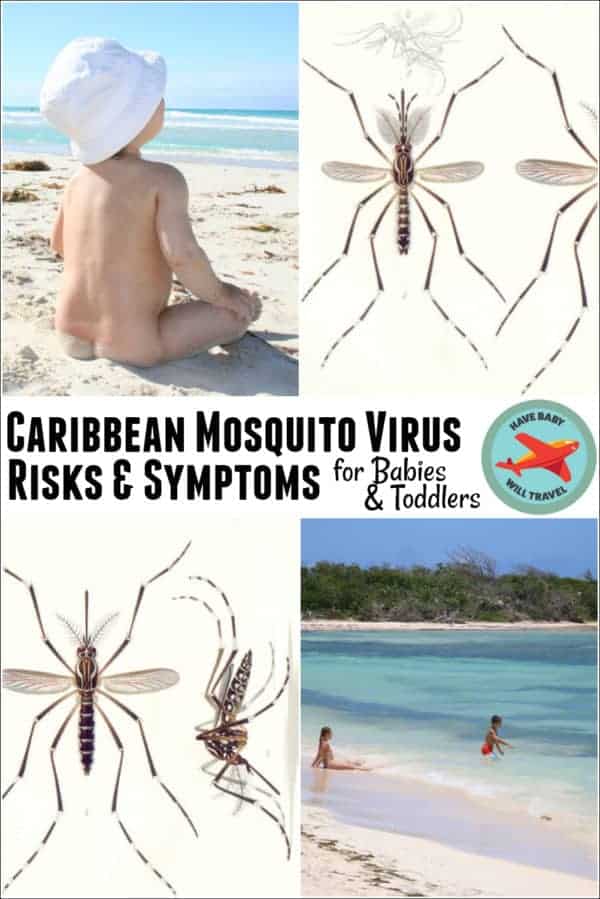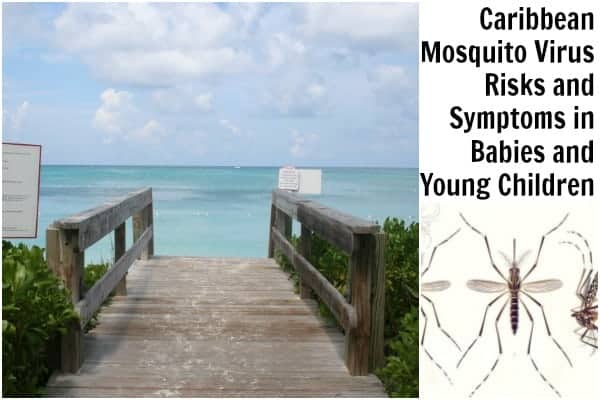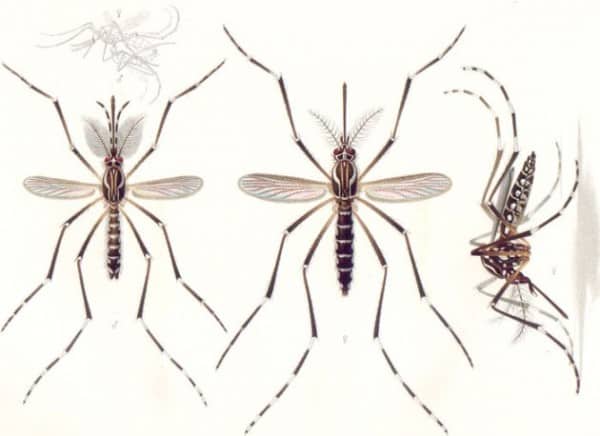
Table of Contents
A Look at Caribbean Mosquito Virus Risks & Symptoms when Traveling with Babies & Young Children
When heading down south for a beach vacation with young children, Caribbean mosquito virus issues are not typically at the top of our list of concerns. Usually we worry about sun safety, gastro illness, and the quality of food, water, and health care available. However, in recent years, Zika changed that. And now, an old foe has reared its (very) ugly head: Dengue.
According to the World Health Organization (WHO), in 2019 the Region of the Americas recorded the highest number of dengue cases in history. Because of this, and because of some recent developments in vaccines and prevention, I updated this post as of May 2021.

Zika, Zika, Zika
Zika virus made a lot of headlines recently. It’s a terrifying reality that pregnant women (or those hoping to become pregnant) are advised to avoid traveling to many Caribbean and South American countries.
The main risk for birth defects (in Zika’s case) is becoming infected while pregnant. But what about Zika in children?
More than just Zika…
But Zika is just one Caribbean mosquito virus present in the Caribbean and in other parts of the world. Visiting popular Caribbean destinations has always meant possible exposure to a number of mosquito-borne diseases. When visiting these destinations, it’s imperative to prevent mosquito bites.
Here is a summary of all the Caribbean mosquito virus risks, symptoms, and treatments. I am not a doctor or medical professional. My research and links are from high-level government websites and alerts.

Caribbean Mosquito Virus: Zika
Zika Locations:
The CDC has a map of countries and territories with active, local transmission of Zika virus. This means the Zika-carrying mosquitos are present and people are acquiring the illness via mosquito bites. Caribbean destinations include Aruba, Barbados, Bonaire, Cuba, Puerto Rico, Curacao, Dominican Republic, Guadeloupe, Haiti, Jamaica, Martinique, Mexico, Saint Martin, Trinidad and Tobago, U.S. Virgin Islands, and Venezuela. If you are pregnant, or thinking about becoming pregnant in the next little while, it’s best to not visit these countries. Change any current travel plans you may have to these areas.
Zika Symptoms:
According to the CDC, “…Zika virus disease in children is usually mild, and treatment is supportive; this includes rest and fluids to prevent dehydration.” If an infected mosquito bites you, symptoms last for a few days to a week. Only about one in five people infected with Zika virus actually develop the illness.
Obviously, Zika’s real (and significant) danger is to infants in utero.
Zika Treatment:
Because the illnesses present similar symptoms, in treating Zika in kids, the CDC recommends that, “Non-steroidal anti-inflammatory drugs (NSAIDS) should not be used until dengue is ruled out as a cause of illness and should be avoided in children aged <6 months. Aspirin is not recommended to treat postnatal viral illness symptoms because of Reye’s syndrome risk.”
Please note that there isn’t much information on long-term outcomes among infants and children with postnatal Zika infections.
Besides ongoing monitoring, Zika treatment seems pretty much the same as treating all mosquito-borne illnesses in kids.
Caribbean Mosquito Virus: Chikungunya
Chikungunya Locations:
The CDC’s Chikungunya map identifies where the virus has been detected around the world. It was first identified in Africa, Asia, Europe, and the Indian and Pacific Oceans. There is local transmission in 45 countries or territories throughout the Americas. Popular Caribbean destinations like Mexico, Jamaica, Cuba, Turks and Caicos, Bahamas, St. Maarten, Cayman Islands, and Dominican Republic all have local Chikungunya transmission.
Chikungunya Symptoms:
The symptoms of chikungunya in children include fever, rash, severe headaches, chills, nausea and vomiting, severe pain in the joints, and diarrhea. Children are more likely to have more severe chikungunya symptoms than adults. Children are also more likely to have rashes, but joint pain is not as common.
According to the CDC, newborns infected around the time of birth are at risk for more severe disease. However, children rarely die from chikungunya.
Chikungunya Treatment:
If your child is exhibiting symptoms of chikungunya, contact your doctor immediately. There is no cure or vaccine for chikungunya. Acetaminophen may reduce fever and pain. Avoid aspirin and ibuprofen, as the anti-inflammatory properties can affect blood platelet counts. Symptoms and fatigue can last for several weeks. Ensure your child gets plenty of rest, plenty of fluids, and nutritious food.
Caribbean Mosquito Virus: Dengue
Dengue Locations:
The CDC’s Dengue map is continually updated. Since the 1950s, dengue has become a worldwide problem. There is currently a major dengue resurgence as of February 2020. It rarely occurs in the continental United States, but it is endemic in Puerto Rico and in many popular tourist destinations in Latin America, Southeast Asia and the Pacific islands, including Hawaii. The Region of the Americas, which includes Mexico and the Caribbean, declared 2019 the worst year in history for dengue cases.
Dengue Symptoms:
Dengue in infants and toddlers usually presents itself similar to a flu, with a high fever, runny nose, cough, and a mild skin rash. Older children may also experience pain behind the eyes and in the joints, and backaches or headaches. Other dengue symptoms include loss of appetite, nausea, vomiting, weakness, and extreme fatigue.
Dengue Treatment:
If you suspect your child has dengue, contact your doctor immediately. They may order a blood test to confirm the diagnosis, as dengue and chikungunya exhibit similar symptoms. There is no cure for dengue. A vaccine, Dengvaxia, was first approved by the FDA in 2019, with major restrictions. Canada has not approved Denvaxia.
Rest, plenty of fluids, and acetaminophen will all help symptoms, which can last for a month or more. As with Chikungunya treatment, avoid using aspirin and ibuprofen. There are three closely related versions of the dengue virus. Recovering from one version does not give you immunity against the other two.
Untreated dengue can lead to dengue haemorrhagic fever (DHF) which can cause bleeding, liver failure, convulsions, and even death. Dengue is serious.
Caribbean Mosquito Illness: Malaria
Malaria Locations:
Malaria is a mosquito-borne illness caused by a parasite, not a virus. According to the WHO, in 2018 there were 405,000 global deaths from malaria, with 94% of those in Africa. The WHO tracks malaria globally. Most Caribbean destinations have no malaria risk. However, according to the CDC the risk is “Very Low” in Belize with a recommendation of mosquito avoidance. For certain parts of Mexico the CDC also recommends mosquito bite avoidance. However, other areas of Mexico require anti-malarials. The CDC considers the Dominican Republic “Low” risk. For travel to the Dominican Republic, anti-malarials are recommended.
Malaria Symptoms:
Malaria is most severe in children younger than five. Symptoms start showing about ten days to four weeks after a bite from a malaria-infected mosquito. Watch out for fever and chills, irritability and fatigue, loss of appetite, insomnia, vomiting, stomach pain, and rapid breathing. Children older than five with malaria may also experience body aches.
Malaria Treatment:
If you suspect your child may have malaria, bring them to the doctor immediately. Only a blood test can confirm malaria. Children under five are at the highest risk of death. Those diagnosed with malaria are generally categorized as having either uncomplicated or severe malaria. Oral anti-malarials usually effectively treat uncomplicated malaria. Severe malaria can result in renal failure, acute respiratory distress, and a whole host of other terrifying maladies, necessitating the use of intravenous antimalarial medications.
Caribbean Mosquito Virus: Yellow Fever
Yellow Fever Locations:
The risk of Yellow Fever is widespread in lots of African countries. But, it also is present in Central and South America. Wandering over to the Americas, Yellow Fever is present in Panama, Colombia, and Venezuela. Trinidad and Tobago is the only Caribbean destinationthat poses a risk of Yellow Fever, and only on Trinidad, not Tobago.
Yellow Fever Symptoms:
Yellow Fever’s symptoms are flu-like, with sudden onset of fever, headache, muscle and joint ache, loss of appetite, chills, and a jaundiced (yellow) appearance. Encouragingly, most recover from Yellow Fever in under a week. However, 15% of cases enter the toxic phase, with the aforementioned symptoms plus abdominal pain, vomiting (sometimes with blood), seizures, delirium, decreased urination, and bleeding from the nose, mouth, and eyes.
Yellow Fever Treatment:
Yellow fever is potentially deadly. So far, it is the most most serious mosquito virus in Caribbean countries. Fortunately, it’s not that widespread. A recommended vaccine is available for travel to affected countries. Proof of vaccination may be required.
For infants and children, however, not all Yellow Fever vaccinations are effective or recommended.
According to the CDC:
Infants aged <9 months are at higher risk for developing encephalitis from yellow fever vaccine, which is a live virus vaccine. Studies conducted during the early 1950s identified 4 cases of encephalitis out of 1,000 children aged <6 months vaccinated with yellow fever vaccine. An additional 10 cases of encephalitis associated with yellow fever vaccine administered to infants aged <4 months were reported worldwide during the 1950s.
Travelers with infants aged <9 months should be advised against traveling to areas within the yellow fever–endemic zone. ACIP recommends that yellow fever vaccine never be given to infants aged <6 months. Infants aged 6–8 months should be vaccinated only if they must travel to areas of ongoing epidemic yellow fever and if a high level of protection against mosquito bites is not possible.
This is not a medical site. Please consult with your doctor before visiting any destination considered a risk for illness.
Lastly, preventing a Caribbean mosquito virus is as simple as avoiding bites from infected mosquitos. Oh, but only if it was that simple… especially with kids!
Tips to avoid mosquito-borne diseases in the Caribbean:
- Wear or dress baby in loose-fitting, light-coloured clothing with long sleeves and pant legs
- Avoid being outside at dawn and dusk, which are peak times for mosquito activity
- Use an insect repellent with DEET. According to the CDC, “DEET may be used on adults, children, and infants older than 2 months of age. Protect infants younger from mosquito bites by using a carrier draped with mosquito netting with an elastic edge for a tight fit.”
- Do not allow children under 10 years of age to apply insect repellent themselves.
- Do not apply insect repellent to young children’s hands or around eyes and mouth.
Alternatives to DEET?
Consumer Reports had this to say about alternatives to DEET-based insect repellent:
Picaridin and oil of lemon eucalyptus—two repellents introduced in the last decade—make good alternatives to DEET. Here’s why:
They work. The repellents we tested that contain 20 percent picaridin and 30 percent oil of lemon eucalyptus (p-Menthane-3,8-diol) warded off mosquitoes for at least 7 hours and kept deer ticks away for at least 6 hours. But the concentration is important: A spray that contained just 5 percent picaridin performed worse than the 7 percent deet product we tested.
They’re safer. Picaridin is made to resemble the compound piperine, which occurs naturally in black pepper plants. Oil of lemon eucalyptus comes from the gum eucalyptus tree. Both have less serious side effects than deet has. Oil of lemon eucalyptus can cause temporary eye injury. The Food and Drug Administration says it should not be used on children under age 3. Of the two, picaridin is a better choice for kids, although it can cause some irritation of skin, eyes, and lungs.
An example of a good Pacaridin-based insect repellent is Natrapel, and the Natrapel wipes are very easy to apply on toddlers and little kids.
**Before traveling with your baby or toddler, please consult with your doctor.
Have Baby Will Travel is a participant in the Amazon Services LLC Associates/Influencer Program. If you make a purchase through this site, we may receive a small commission. Click here to check out our Amazon Store.
Very good info! Will share with my readers, as I know many will be going to the Caribbean this spring and summer!
We were just in Mexico and my daughter got some huge mosquito bites within hours of arrival (despite bug spray). Luckily no illness but it is scary stuff.
Such important information for traveling parents!
Wow this is very informative. Thanks for all the tips!
Good post